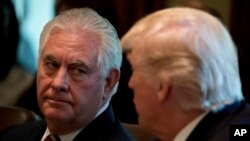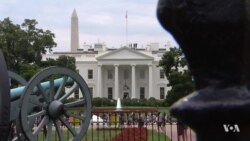As the U.S. State Department marks its 228th birthday this month, the agency in charge of American diplomacy finds itself at a turning point, facing the threat of deep budget cuts and with many high-profile positions vacant.
The Department of State was the first government agency created under the new U.S. Constitution in July 1789. Today, however, turmoil at the White House and rumors of a possible Cabinet shake-up have spilled over to State, as it is popularly known, and prompted speculation that Secretary of State Rex Tillerson might be contemplating leaving his post. The department has repeatedly denied the reports about Tillerson.
The former ExxonMobil CEO spoke for himself in a joint appearance with his Qatari counterpart, telling a reporter Wednesday: “I’m not going anywhere.”
Asked how long he would stay, Tillerson, who is 65, responded: “As long as the president lets me.”
Watch: Tillerson Says He Is Staying as State Department Faces Turbulence
A job of great prestige and authority
Some analysts say he faces unique challenges, but getting to be the top U.S. diplomat is the chance of a lifetime.
Aaron David Miller of the Wilson Center told VOA it would be a hard opportunity to pass up.
“It is a job that carries tremendous prestige and authority. I mean, defending the United States abroad is an extraordinary sense of mission and excitement,” Miller said. “And I suppose and, clearly as you know, Tillerson was not Mr. Trump’s first choice.”
In the end, Miller said he believes Tillerson was Trump’s best choice, because he has decades of experience running one of the world’s largest corporations. He worked continuously for ExxonMobil from the time he completed engineering studies until Trump tapped him for the Cabinet.
Some former diplomats and foreign policy experts have expressed concerns about the many problems — potentially painful budget cuts, open differences between Tillerson and President Donald Trump, and numerous unfilled high-level positions — and their effect on the State Department’s 36,000 employees.
Employees ‘as dedicated as ever’
Spokesperson Heather Nauert told VOA Thursday those employees still see their work as a calling.
“Two-hundred and twenty-eight years later, the department remains strong and relevant, and as dedicated to U.S. national security, economic prosperity and the safety and security of our citizens as it has ever been,” Nauert said.
Talk about the possible closure of State’s Office of Global Criminal Justice has worried many analysts. The office advises the secretary of State on issues related to war crimes, crimes against humanity and genocide.
Jonathan Katz, a fellow at The German Marshall Fund, said such a move would send the wrong message to the world.
“It sends the wrong signal that the U.S. is withdrawing from key issues, whether it’s climate change or atrocity prevention. ... From the perspective of previous administrations and others, both Republican and Democrat, we both see that this is going to have an impact on U.S. interests globally in the wrong way, in the wrong direction,” Katz said.
Key office will remain intact
But Nauert broke news on that point Thursday, telling VOA the functions of the Office of Global Criminal Justice will remain at the State Department and its work will continue, although the assignment of its current special coordinator, Todd Buchwald, will come to an end.
Katz told VOA the office has done critical work for decades, such as addressing human-rights violations in Sudan and in navigating sensitive issues at the International Criminal Court in The Hague.
The office “has been part of an effort to ramp up overall U.S. engagement ... [in] preventing atrocities from occurring,” he said.
State describes the mission of the Office of Global Criminal Justice as coordinating the U.S. government’s positions relating to international and hybrid courts currently prosecuting persons responsible for genocide, war crimes and crimes against humanity.






